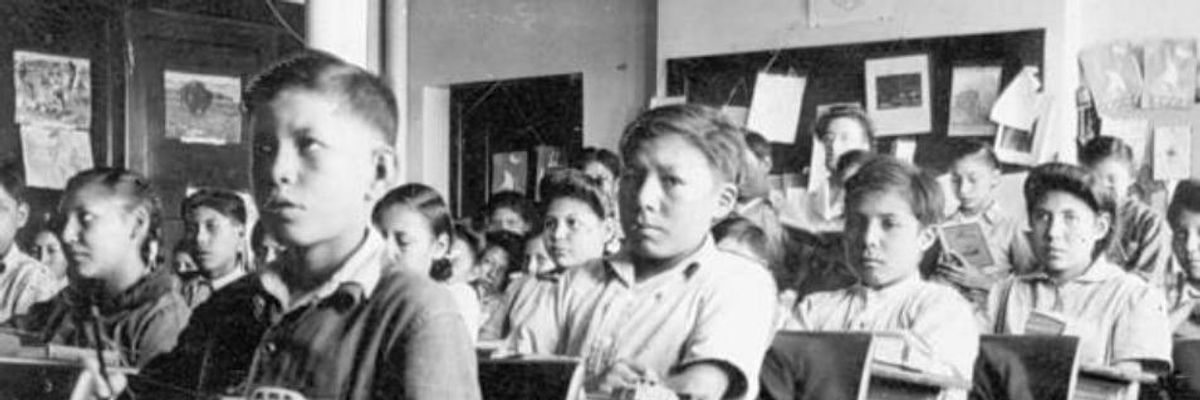The Canadian government's historic practice of forcibly removing Indigenous youth from their homes and sending them to "residential schools"--where tens of thousands were subjected to abuse, malnutrition, substandard education, illness, and often death--amounts to nothing short of "cultural genocide," charged the country's Truth and Reconciliation Commission (TRC), which on Tuesday released its years-long investigation into the program.
The culmination of six years of research and 6,750 survivor and witness statements, the report argues that the Canadian government operated the school program with the explicit purpose of breaking children's link "to their culture and identity," and describes a "lonely and alien" existence, where students' native languages and practices were suppressed and neglect and abuse were common.According to the report:
Buildings were poorly located, poorly built, and poorly maintained. The staff was limited in numbers, often poorly trained, and not adequately supervised. Many schools were poorly heated and poorly ventilated, and the diet was meager and of poor quality. Discipline was harsh, and daily life was highly regimented. Aboriginal languages and cultures were denigrated and suppressed. The educational goals of the schools were limited and confused, and usually reflected a low regard for the intellectual capabilities of Aboriginal people. For the students, education and technical training too often gave way to the drudgery of doing the chores necessary to make the schools self-sustaining. Child neglect was institutionalized, and the lack of supervision created situations where students were prey to sexual and physical abusers.
"These measures were part of a coherent policy to eliminate Aboriginal people as distinct peoples and to assimilate them into the Canadian mainstream against their will," the report states. Further, the Commission argues that the government "pursued this policy of cultural genocide because it wished to divest itself of its legal and financial obligations to aboriginal people and gain control over their land and resources."
Over the course of 150 years, an estimated 150,000 Indigenous children spent time in roughly 80 residential schools throughout the country. Approximately 80,000 survivors are still alive today.
The Commission lays out 94 calls for action, which it says are the "first steps" toward addressing the legacy of injustice and advancing the process of reconciliation.
Among the recommendations are efforts to protect child welfare, preserve language and culture, promote legal equity, and strengthen information on missing children. The report also emphasizes the important role that education can have in the healing process and calls for Canadian governments to work towards eliminating the education gap between Indigenous and non-Indigenous children, as well as develop curriculum on residential schools.
"The children who attended these schools were severely punished for practicing their cultural ceremonies, for speaking their family's language," said TRC Commissioner Dr. Marie Wilson. "Reconciliation rests on building aboriginal culture back up, and preserving the languages and ceremonies that the schools tried to eliminate."
The report also calls on governments across Canada to adopt and implement the United Nations Declaration on the Rights of Indigenous Peoples (pdf), which the Commission says will also help achieve successful reconciliation.
"One hundred years from now, our children's children and their children must know and still remember this history, because they will inherit from us the responsibility of ensuring that it never happens again," the report says.
The TRC was established in 2007 as a result of the Indian Residential Schools Settlement Agreement.
